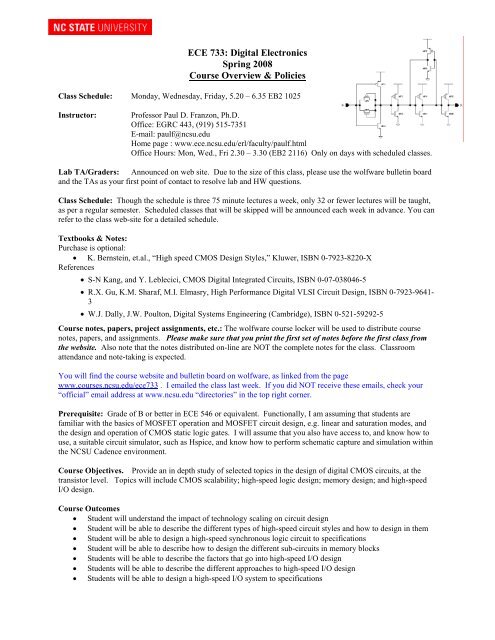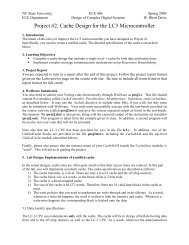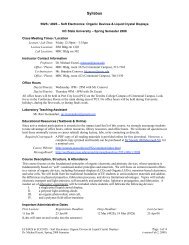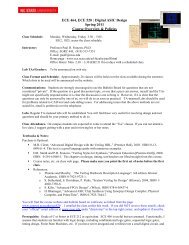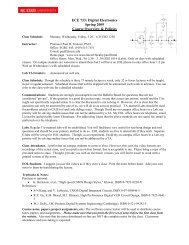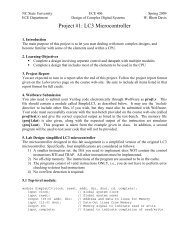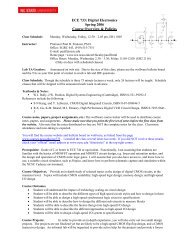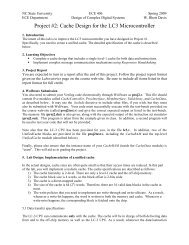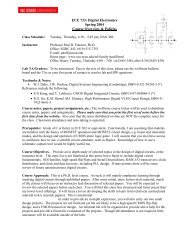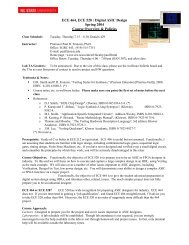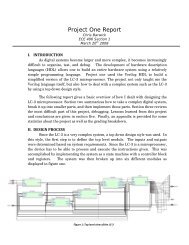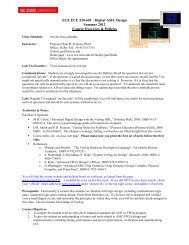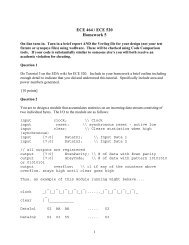Create successful ePaper yourself
Turn your PDF publications into a flip-book with our unique Google optimized e-Paper software.
ECE 733: Digital Electronics<br />
Spring 2008<br />
<strong>Course</strong> Overview & Policies<br />
Class Schedule: Monday, Wednesday, Friday, 5.20 – 6.35 EB2 1025<br />
Instructor: Professor Paul D. Franzon, Ph.D.<br />
Office: EGRC 443, (919) 515-7351<br />
E-mail: paulf@ncsu.edu<br />
Home page : www.ece.ncsu.edu/erl/faculty/paulf.html<br />
Office Hours: Mon, Wed., Fri 2.30 – 3.30 (EB2 2116) Only on days with scheduled classes.<br />
Lab TA/Graders: Announced on web site. Due to the size of this class, please use the wolfware bulletin board<br />
and the TAs as your first point of contact to resolve lab and HW questions.<br />
Class Schedule: Though the schedule is three 75 minute lectures a week, only 32 or fewer lectures will be taught,<br />
as per a regular semester. Scheduled classes that will be skipped will be announced each week in advance. You can<br />
refer to the class web-site for a detailed schedule.<br />
Textbooks & Notes:<br />
Purchase is optional:<br />
• K. Bernstein, et.al., “High speed CMOS Design Styles,” Kluwer, ISBN 0-7923-8220-X<br />
References<br />
• S-N Kang, and Y. Leblecici, CMOS Digital Integrated Circuits, ISBN 0-07-038046-5<br />
• R.X. Gu, K.M. Sharaf, M.I. Elmasry, High Performance Digital VLSI Circuit Design, ISBN 0-7923-9641-<br />
3<br />
• W.J. Dally, J.W. Poulton, Digital Systems Engineering (Cambridge), ISBN 0-521-59292-5<br />
<strong>Course</strong> notes, papers, project assignments, etc.: The wolfware course locker will be used to distribute course<br />
notes, papers, and assignments. Please make sure that you print the first set of notes before the first class from<br />
the website. Also note that the notes distributed on-line are NOT the complete notes for the class. Classroom<br />
attendance and note-taking is expected.<br />
You will find the course website and bulletin board on wolfware, as linked from the page<br />
www.courses.ncsu.edu/ece733 . I emailed the class last week. If you did NOT receive these emails, check your<br />
“official” email address at www.ncsu.edu “directories” in the top right corner.<br />
Prerequisite: Grade of B or better in ECE 546 or equivalent. Functionally, I am assuming that students are<br />
familiar with the basics of MOSFET operation and MOSFET circuit design, e.g. linear and saturation modes, and<br />
the design and operation of CMOS static logic gates. I will assume that you also have access to, and know how to<br />
use, a suitable circuit simulator, such as Hspice, and know how to perform schematic capture and simulation within<br />
the NCSU Cadence environment.<br />
<strong>Course</strong> Objectives. Provide an in depth study of selected topics in the design of digital CMOS circuits, at the<br />
transistor level. Topics will include CMOS scalability; high-speed logic design; memory design; and high-speed<br />
I/O design.<br />
<strong>Course</strong> Outcomes<br />
• Student will understand the impact of technology scaling on circuit design<br />
• Student will be able to describe the different types of high-speed circuit styles and how to design in them<br />
• Student will be able to design a high-speed synchronous logic circuit to specifications<br />
• Student will be able to describe how to design the different sub-circuits in memory blocks<br />
• Students will be able to describe the factors that go into high-speed I/O design<br />
• Students will be able to describe the different approaches to high-speed I/O design<br />
• Students will be able to design a high-speed I/O system to specifications
<strong>Course</strong> Projects: In order to provide an in-depth experience, you will also carry out two small design<br />
projects. The projects are not finalized yet but are likely to be a high-speed CMOS flip-flop design, and a CMOS<br />
transceiver design. An informal lab will be organized to provide active help for the projects and provide a forum<br />
for evaluation of the projects. Though lab attendance is not required, little assistance will be available outside of the<br />
labs.<br />
<strong>Course</strong> <strong>Syllabus</strong><br />
1. Introduction<br />
2. Static logic gates<br />
3. Dynamic logic gates<br />
4. Flip-flops<br />
5. Timing and design<br />
6. Interconnect<br />
7. Transceiver Design<br />
8. Memories<br />
Software Requirements. You will need access at least to a Spice simulator for this course, and preferably also a<br />
schematic capture tool. On campus students will be encouraged to use Hspice, and Composer. Off campus students<br />
will be given access to these tools but can also use their companies or third party tools (e.g.<br />
http://www.duncanamps.com/spicesim.html lists a number of free Spice tools).<br />
Student Evaluation. You will be evaluated as follows:<br />
� Homeworks. There will be a small number of homeworks to force review of specific issues. (20%)<br />
� Midterm. (20%)<br />
� Projects. You will be individually graded on two small projects. Each project is worth 20% of the grade.<br />
(40%).<br />
� Final exam. On material covered since the midterm. (20%)<br />
Midterm Exam February 28 In class<br />
Final Exam Monday, April 28, 1 pm In class<br />
Collaboration is encouraged on the homeworks and projects but you are expected to turn in individual solutions and<br />
reports. Sharing of electronic files is expressly forbidden. It is easy to tell if a circuit design has been copied. The<br />
exams will be open-book, open-notes, multiple-choice and short answer exams.<br />
Important Dates<br />
o See class calendar<br />
Instructor Research Interests<br />
o Application specific processors. Current projects are in network security, Radar Processors, speech<br />
recognition, and secure IP Design.<br />
o Interconnect, including transceivers, electronic packaging, on-chip interconnect, and between-chip<br />
interconnect.<br />
o Nanocomputing – how to build the computers that will eventually displace or complement CMOS.<br />
Students with disabilities<br />
Reasonable accommodations will be made for students with verifiable disabilities. In order to take advantage of<br />
available accommodations, students must register with Disability Services for Students at 1900 Student Health<br />
Center, Campus Box 7509, 515-7653. http://www.ncsu.edu/provost/offices/affirm_action/dss/ For more information<br />
on NC State's policy on working with students with disabilities, please see<br />
http://www.ncsu.edu/provost/hat/current/appendix/appen_k.html<br />
Academic integrity<br />
All the provisions of the code of academic integrity apply to this course. In addition, it is my understanding and<br />
expectation that your submission on any test or assignment means that you neither gave nor received unauthorized<br />
aid. For homeworks and projects, while collaboration is encouraged, sharing of design data is expressly not<br />
permitted. In particular sharing of any electronic files, or schematics is forbidden.


